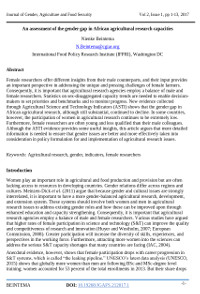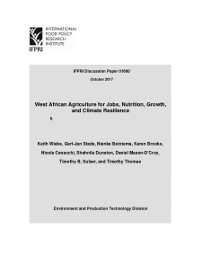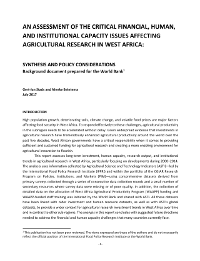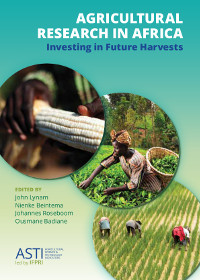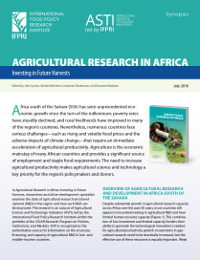Overview publications
Authors:
Nienke Beintem
Year:
2017
Publisher
International Food Policy Research Institute (IFPRI), Washington DC
Back to:
Female researchers offer different insights from their male counterparts, and their input provides an important perspective in addressing the unique and pressing challenges of female farmers. Consequently, it is important that agricultural research agencies employ a balance of male and female researchers. Statistics on sex-disaggregated capacity trends are needed to enable decision-makers to set priorities and benchmarks and to monitor progress.
Authors:
Keith D. Wiebe, Gert-Jan Stads, Nienke M. Beintema, Karen Brooks, Nicola Cenacchi, Shahnila Dunston, Daniel Mason-D’Croz, Timothy B. Sulser, Timothy S. Thomas
Year:
2017
Publisher
International Food Policy Research Institute
Back to:
West African countries will need to build on and enhance the largely positive performance of agriculture in recent years to moderate or perhaps reverse projected higher prices and growth in imports. The effects of increased demand and climate change will be felt as early as 2030, and with greater force in 2050.
Bilan détaillé des investissements et des ressources humaines affectées à la recherche agricole africaine
En Afrique au sud du Sahara, c’est une exploitation intensifiée des terres (relativement abondantes) plutôt qu’un renforcement de l’efficacité technique qui a été la force motrice de la croissance agricole pendant les 50 dernières années. Cependant, l’accroissement démographique rapide et les effets néfastes du changement climatique pèsent toujours plus sur la disponibilité et la fertilité des terres en menaçant aussi l’accès à l'eau.
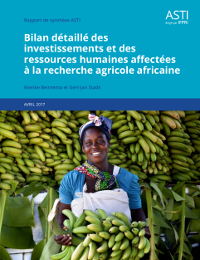
Authors:
Gert-Jan Stads and Nienke Beintema
Year:
2017
Publisher
International Food Policy Research Institute
Back to:
SYNTHESIS AND POLICY CONSIDERATIONS
La recherche agricole en Afrique: Investir dans les futures récoltes: Synopsis
Depuis le passage au nouveau millénaire, l’Afrique au sud du Sahara (ASS) a connu une croissance économique sans précédent : dans la plupart des pays africains, les taux de pauvreté ont régulièrement diminué et les sources de revenus en zone rurale se sont améliorées. Nombre de pays sont toutefois confrontés à des défis de taille — volatilité et augmentation des prix des denrées alimentaires et effets néfastes du changement climatique —, qui les contraignent à accélérer sans délai leur productivité agricole.
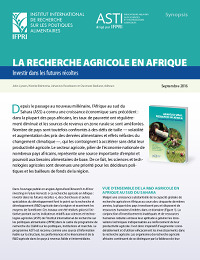
Authors:
John Lynam, Nienke Beintema, Johannes Roseboom, Ousmane Badiane, eds
Year:
2016
Publisher
International Food Policy Research Institute (IFPRI)
Further information
Individual book chapter downloads are available on the IFPRI website
Back to:
Agriculture in Africa south of the Sahara is at a prospective tipping point. Growth has accelerated in the past decade, but is unsustainable given increasing use of finite resources.
Agricultural Research in Africa: Investing in Future Harvests discusses the need to shift to a growth path based on increased productivity—essential if Africa is to increase rural incomes and compete in both domestic and international markets. Such a shift ultimately requires building on evolving improvements that collectively translate to deepening rural innovation capacity.
Authors:
John Lynam, Nienke Beintema, Johannes Roseboom, Ousmane Badiane, eds
Year:
2016
Publisher
International Food Policy Research Institute (IFPRI)
Further information
The full book including Individual chapter downloads are available on the IFPRI website
Back to:
Agriculture in Africa south of the Sahara is at a prospective tipping point. Growth has accelerated in the past decade, but is unsustainable given increasing use of finite resources.
Agricultural Research in Africa: Investing in Future Harvests discusses the need to shift to a growth path based on increased productivity—essential if Africa is to increase rural incomes and compete in both domestic and international markets. Such a shift ultimately requires building on evolving improvements that collectively translate to deepening rural innovation capacity.
I&D AGROPECUARIA EN AMÉRICA CENTRAL: POLÍTICAS, INVERSIONES Y PERFIL INSTITUCIONAL
Aunque son relativamente pequeños y diversos entre sí, los países de América Central (Belice, Costa Rica, El Salvador, Guatemala, Honduras, Nicaragua y Panamá) encaran parecidos desafíos socioeconómicos y agropecuarios, comparten condiciones agroecológicas y climáticas comunes y, en conjunto, representan a unos 40 millones de personas con un patrimonio cultural común.
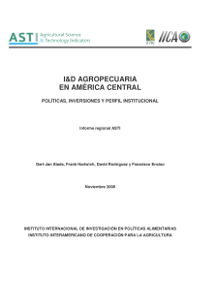
Authors:
Gert-Jan Stads, Frank Hartwich, David Rodríguez, and Francisco Enciso
Year:
2008
Publisher
International Food Policy Research Institute (IFPRI); and Inter-American Institute for Cooperation on Agriculture
Back to:
Drawing from comprehensive datasets derived from primary surveys, this report reviews the major institutional developments and investment and human resource trends in public agricultural research and development (R&D) in the seven countries that constitute Central America: Belize, Costa Rica, El Salvador, Guatemala, Honduras, Nicaragua, and Panama.
Investigación agropecuaria en Latinoamérica y el Caribe: un análisis de las instituciones, las inversiones y la capacidad
La región de Latinoamérica y el Caribe (LAC) está bien posicionada para incrementar su producción agropecuaria en respuesta a una población globalmente en crecimiento y un clima cambiante. La ventaja comparativa de la región se explica en parte, por la abundancia de naturales, incluyendo el agua.

